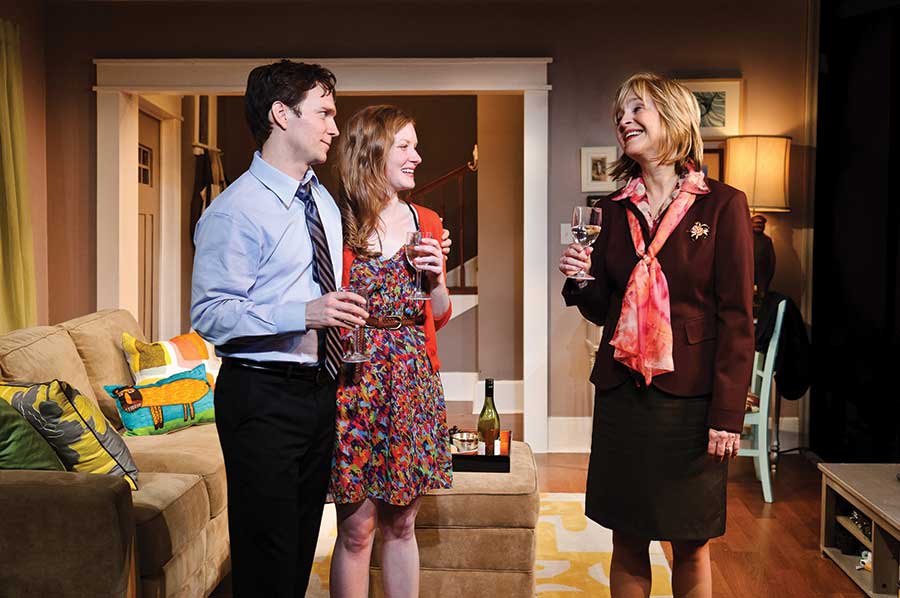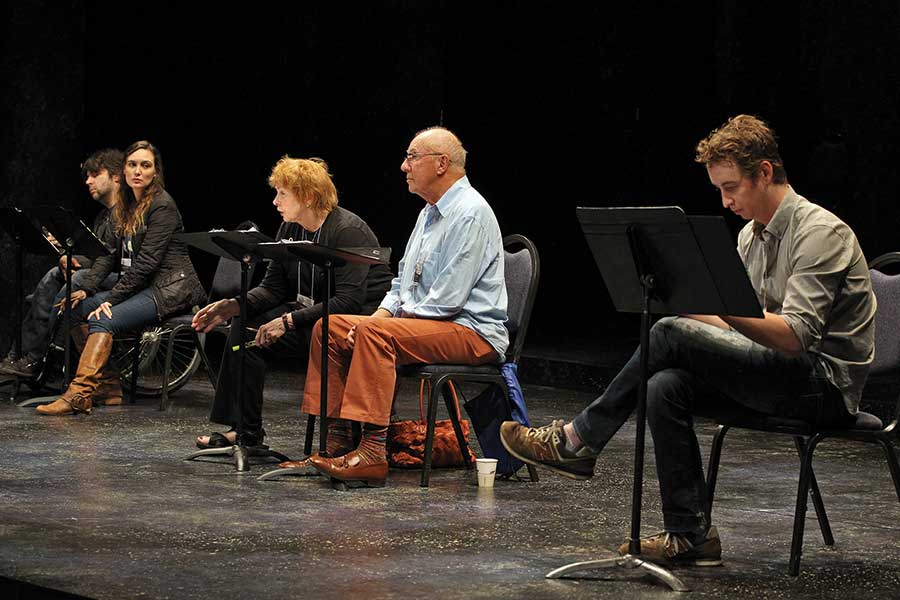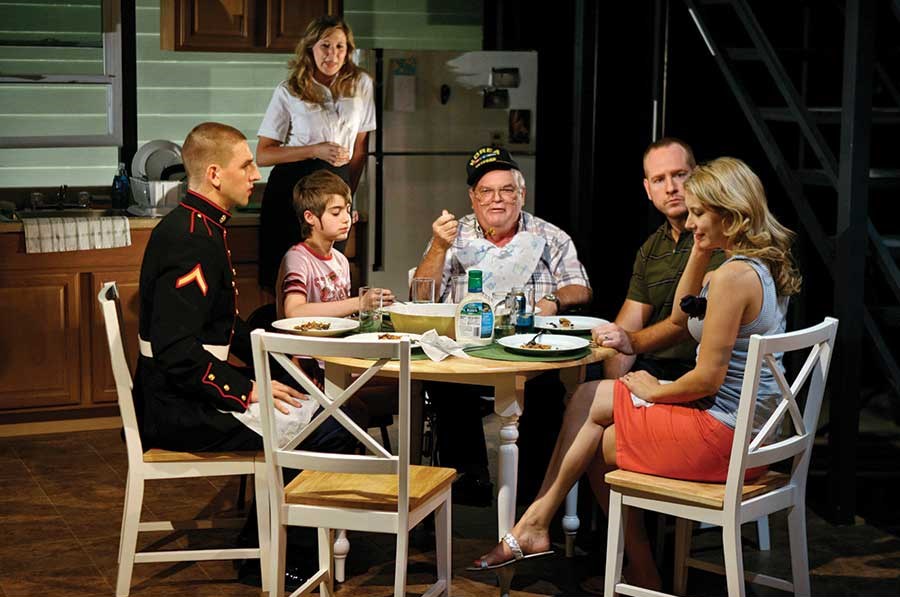Bekah Brunstetter is drinking white wine and having a lunch meeting, like the fancy lady she imagines herself to be. In her fantasy, afternoon drinks over leisurely meals are the norm, even if her reality, as an in-demand playwright and TV writer, doesn’t always accommodate these whims.
But as it’s the first day of holiday hiatus from her new TV writing gig (as a coproducer for the in-development Starz series “American Gods”), and she’ll leave the next day for North Carolina to visit her family, her new fiancé in tow, a toast is definitely in order.
This lunch also marks my first chance to meet Brunstetter in person, though I’ve been following and admiring her work for years. Seeing her Be a Good Little Widow at New York City’s Ars Nova in 2011 was a formative theatregoing experience for me. This play, about an aimless twentysomething who finds herself widowed too young, hit close to home. I hadn’t been widowed, but as a twentysomething wrestling with the consequences of my own large decisions—I’d recently started a new job and a new relationship and cut my hair, events of roughly equal weight at that age—I felt completely known in a way I hadn’t before in the theatre.
Because Brunstetter and I have emailed and spoken by phone over the years—mainly about her work with the gender parity advocacy group the Kilroys—it feels oddly familiar to sit down at an Italian restaurant in the Los Feliz neighborhood of Los Angeles, where Brunstetter has lived since she first moved here four years ago from New York City. “I feel like I know you already!” she says with a smile and a hug.
Brunstetter and I also share similar upbringings: We’re both only girls among brothers, and we both grew up around conservative Christian theology. This is important to note, as the stories she tells usually contain elements of her own experience. “Her plays often begin with something in her own life, and I suppose a lot of playwrights are like that, but she’s very conscious of it,” says Evan Cabnet, who directed her play Oohrah! at NYC’s Atlantic Theater Company in 2009. The play follows a soldier returning home to his family in North Carolina after a final tour in Iraq, and is inspired by Brunstetter’s own experience growing up among three brothers in the military. “She writes about people in a part of country that are not seen on our stages and represent a huge part of our country,” Cabnet adds.

And almost all of her plays have a female character around the same age as her at the time of writing. “I have to put myself in—I don’t know how else to do it,” Brunstetter explains. “Because writing is kind of therapy for me and it is my space to say things that I’m too scared to say in real life, it’s a little selfish and it’s a little messy and for me to get through it, I have to have the ‘me’ character.”
She initially tried to write her newest play, Going to a Place Where You Already Are, running at South Coast Repertory (SCR) in Costa Mesa, Calif., March 6–27, without the “me” character. But 30 pages into writing, she added Ellie, a thirtysomething social-media manager who closes herself off from the world only to be forced to reckon with her relationships when her step-grandmother falls ill.
The play’s elder character, Roberta, is named after Brunstetter’s grandmother, who died five years ago, but bears a hodge-podge of traits both from her and from Brunstetter’s step-grandmother, Jeannine, who died last year. At one point, the character Roberta goes to the doctor with back pain, only to find out she has cancer and mere months left to live—which is exactly what happened to Jeannine. But for all its heavy themes of love, loss, and the afterlife, the play is ultimately uplifting.
“It’s so positive in its message,” says SCR artistic director Marc Masterson, who is helming the production. “There’s a lot of cynicism in the world, and there’s a lot of playwrights who would go to a much darker place. In this case, it’s the honesty that she’s tackling the topic with and the personal approach that she carries with her.”
In the play, Roberta has a near-death experience and goes to Heaven, and the importance of belief and the possibility of life after death are questions the play takes seriously. Since she was raised in a conservative Christian home, Brunstetter feels compelled to create nuanced and authentic portraits of believers onstage that don’t follow the often satirical norm.
Still, she admits, “Even when I think I’m not being satirical, I am.” She listens to Baptist hymns while she writes, as it was the first music that made her “feel things.” “I feel like it’s my responsibility to come at characters who believe in God from a different angle and find humor and intelligence within their belief system.”
Brunstetter identified as a writer from a young age—she called herself an “author” as a child, writing short stories and poems. She’s the only creative person in her family; her father’s a lawyer and her mother’s a homemaker. Her entry into theatre came in high school, when she started at a new public school after attending a private Christian middle school, and she needed to meet new friends. She began writing plays in college at the University of North Carolina–Chapel Hill, and her first play, which she wrote for a contest, was about a 23-year-old being kept prisoner in her house by her parents, who have been telling her she’s 13 for the past 10 years. Then an imaginary friend named Jesus starts bringing her things from the outside world.
“It’s such a hilariously clichéd first play, like my parents didn’t tell me the truth!” Brunstetter says with a laugh, then adds more seriously: “My parents didn’t see anything that I wrote for the first two or three years, because I was really writing about stuff that I couldn’t quite share with them yet. My parents are conservative, and for a long time I didn’t give them enough credit. I was always afraid that I was going to offend them. But they’re adults. They don’t love seeing plays written by their daughter in which people are having a lot of sex and cussing, but they can handle it because they’re grownups.”
There are still some things she hasn’t shared with them about Going to a Place. In the play, Ellie smokes, much to the dismay of Roberta, who smoked in her youth and blames the habit for her cancer diagnosis. Brunstetter also smoked in her 20s, a habit she regrets and has since quit. (Roberta’s namesake died from complications of smoking.) “Not smoking anymore is a huge relief for me, but I still have little demons inside of me that are like: ‘You killed yourself. Well done, asshole. You’ve wasted your precious time on Earth.’”

A nagging sense of fear permeates many of Brunstetter’s plays, and she even affectionately refers to three of her plays—Be a Good Little Widow, A Long and Happy Life, and Cutie and Bear—as “The Worry Trilogy.” All three deal with the fragility of life in some manner, and Brunstetter received the commissions for them—from Ars Nova, Naked Angels, and Roundabout Theatre Company, respectively—at a time when she was dealing with her newfound phobias of flying and subway bombings. (Cutie and Bear was announced for a run at Roundabout in 2014 but fell through; A Long and Happy Life fell apart when Naked Angels started struggling as a producing company.)
Going to a Place might be put in the “worry” category as well, as Brunstetter wrestles with her own beliefs in the play. “I know I believe in God and I’m still figuring out what that means and what I know beyond that, which isn’t a lot of things,” she admits.
Though it’s based on her grandmothers’ stories, the play was also partly inspired by her mother, who sends Brunsetter books about people who have had near-death experience and go to Heaven, such as Heaven Is for Real. (She has four copies of that one, in fact, as well as the audiobook and a DVD, and they’re part of a whole “Heaven” section on her bookshelf.) Along with one of the books, her mother included a note suggesting she write a play on the topic; that note had been sitting on Brunstetter’s refrigerator when she received a commission from South Coast Rep.
She wrote the play in L.A.’s Center Theatre Group writing group. As part of that experience, she was partnered with two experts: Pastor Tony Davis, an L.A.-based church leader who had a near-death experience, and David Kessler, a death and grieving expert who collaborated with Elisabeth Kübler-Ross on her famous studies of death and grief. It was Kessler who gave Brunstetter the idea for the play’s title—she always needs a title before she can begin writing—when he told her the story of working with an elderly couple. As the woman was fading away, he recounted, her husband asked, “Where are you going?” To which she responded: “I’m going to a place where you already are.”
She also interviewed her own grandparents about their thoughts on the afterlife. Her grandfather was an extreme atheist—as is the character of Joe in the play—and her step-grandmother was a lapsed Catholic. Neither was especially forthcoming in their responses to her questions. But, six months later, Jeannine was diagnosed with cancer and died, and her grandfather followed five months later. “It was really crazy to be asking them these questions at a point where they weren’t fully confronting the questions yet, and then within a couple of months, it was real,” Brunstetter says.
It’s becoming more difficult for Brunstetter to get into the brain space of the struggling writer—something she says she finds essential to her craft but which grows ever further from her experience, with her established Hollywood career and a happy personal life. What’s more, she doesn’t have as much time as she used to devote to playwriting; with the demands of her TV job and other projects, she has to be really rigid about her time management.
Time pressures aside, she also has trouble just finding the headspace for playwriting. So when she started writing Going to a Place, she spent a few hours in a sensory deprivation chamber—basically a sound-proof pod filled with salt water that you float in in a dark room. “A play isn’t thought, it’s felt,” she explains. “It’s not like I start typing now; it’s having to get into the feeling and get into the questions, which honestly becomes harder and harder to do when you’re doing other things.”

Still, that doesn’t stop her from writing every night when she gets home from work—sometimes on her blog, which she updates every day with short posts about everything from her engagement story to funny church signs she found on Google, and sometimes on a new project. She always writes her plays in Microsoft Word, she says, because the scriptwriting software Final Draft “feels like work.”
She gets the work done, in any case. Brunstetter’s collaborators marvel at her ability to take notes and do rewrites; Masterson even says he would use the process of writing Going to a Place as a case study to teach students about workshopping a play, as so much has changed over the course of its four readings at SCR.
“She’s not precious about her writing,” adds Lizzy Weiss, the creator of “Switched at Birth.” The ABC Family drama is what brought Brunstetter to L.A. permanently, and she was on the writing staff for three years. Weiss calls her writing “playful” and applauds her calm demeanor when taking notes from higher-ups and her willingness, even eagerness to make changes. “She doesn’t have a lot of agony or torture about it. She just goes home and flips on writing like a pair of old shoes and does it. It’s just a muscle she exercises every day. She just writes and writes and writes.”
This practice works to her advantage: She used to have a service called “Homemade Monologues,” personalized monologues she would write for actors at $60 a pop. And she has countless plays in her drawer that have never been produced; when asked what play she sent as a writing sample to get the job on “Switched at Birth,” she says it was just a short play she wrote while stuck in the airport one holiday. She’s reachable via her website and is happy to send plays if anyone, from a student to a theatre company, requests them.
“I see playwrights getting really angry online: ‘They did my play and they didn’t pay me, and I didn’t know!’” she says. “I understand that, but I’m more like, ‘I wrote it. What am I going to do? Do it!’ It’s easier for me to say that because I’m not relying on theatre for my income right now. I’ve always been of the mindset: I wrote it not to sit on my computer but so that the actors can work on it.”
And she’s always excited to try new forms. She wrote a web series called “Guidance” for the online channel AwesomenessTV, and she wrote her first screenplay during her time on “Switched at Birth”: the official adaptation of the cultural phenomenon The Secret. Brunstetter describes her take on this Oprah-approved philosophy of positive thinking as a John Hughes–like movie.
“I knew that if I wanted to write a good movie, I needed to believe in the philosophy, and I can totally get behind the fact that if you change your outlook, you’re going to attract better things,” she says. “I feel really strongly that movies and plays and TV right now should be optimistic because there are so many horrible things right now.”
Rain has started to fall outside and the restaurant is starting to prepare for the dinner crowd. Despite her “ladies who lunch” fantasy, Brunstetter declines a second glass. Drinking wine all afternoon might make for a good character in a play, but Brunstetter is practical: Her weekends are valuable time to get stuff done, and she can’t sleep away the day. As she heads to her car, she says with a smile: “I’m going to go do some playwriting.”


